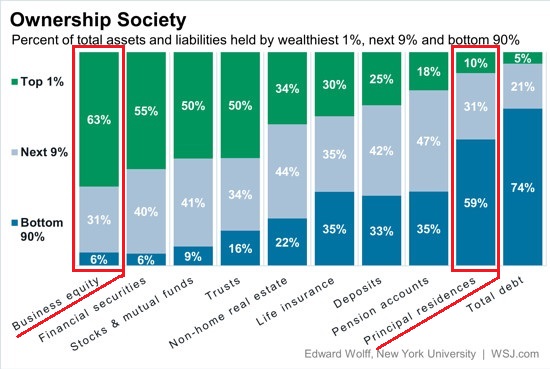Redefining the Middle Class: It Isn't What You Earn and Owe, It's What You Own That Generates Income
May 3, 2017
No wonder the "middle class" has lost political power--it has lost the economic power of the ownership of productive assets.
Longtime correspondent Mark G. observed that the key phrase in yesterday's excellent commentary by correspondent Ron G. is property-owning middle class. Mark wrote: "It appears to me that the income bracket method used today isn't very informative."
Here is Ron's commentary again:
"The American economy and people are not being served by a government that was designed to be a Democratic Republic, whose architecture and balance of power depended on a property-owning middle class to be the countervailing force against Oligarchy; given the irreversible nature of the market and technology that contributed to the decline of the US middle class, (globalization, automation and AI), it is apparent that we will stay on this downward track of the middle class for the immediate future, and therefore more disparity, dispossession, and coercion will be needed to maintain control, and to me this means a future of intimidation, censorship and continued involuntary servitude."
What does property-owning actually mean? to answer that, we have to tease apart earnings, debt and what assets are owned.
The core contradiction in the present-day version of capitalism is between production and consumption: The system must produce goods and services that can be sold at a profit, and there has to be consumers who are able to buy the goods and services.
Over time, the focus in our culture and economy has shifted from production to consumption, and from acquiring capital to credit-funded consumption. The balance between production and consumption is dynamic and can become dangerously asymmetric; if there are only producers and no consumers, the goods and services pile up unsold and enterprises go bankrupt. If there are only consumers and no producers, the system eats its seed corn (capital) and sinks into impoverishment.
As Mark noted, the income of a household reflects very little of this distinction. Many households enjoy incomes above $100,000 annually but they own essentially nothing. By income alone, we categorize the household as "middle class."
But if we consider their total debt load, their ownership of income-producing assets and assets they own free and clear--essentially nothing--then they must be re-categorized as well-paid proletarians.
So what happens when we redefine the qualifications of "middle class" from what you earn and owe to what you own free and clear that generates income? How many American households qualify as "middle class" under this new definition?
Longtime readers know I have addressed the characteristics of the middle class in some depth for many years. For example:
What Does It Take To Be Middle Class? (December 5, 2013)
The Destabilizing Truth: Only the Wealthy Can Afford a Middle Class Lifestyle (May 6, 2014)
Under this new definition, every household one housing-bubble-burst away from the destruction of their home-equity "wealth" isn't really middle class. Neither are households a paycheck or two away from insolvency.
In Endangered Species: The Self-Employed Middle Class (May 2015), I reported on the results of poring over IRS income and deduction data. Of the 141 million taxpayers reporting income, only 7 million earn a middle class income from an enterprise they own (sole proprietorship or professional corporation).
Compare this to what the wealthy own. Note that the bottom 90%'s assets are largely the family home, an asset which is offset by a heavy burden of debt. The wealthy own income-producing assets: business equity, stocks, bonds, trusts and rental real estate.

No wonder the "middle class" has lost political power--it has lost the economic power of the ownership of productive assets, which is the foundation of political power. A class of well-paid proletarians burdened with debt is not middle class --it is a class of debt-serfs who have been persuaded that debt-fueled consumption is wealth because this delusion is politically useful to the self-serving elites who own the wealth and thus the power.
Mark's conclusion is sobering:
"With no genuine middle class exerting power we are left merely with competing groups
of oligarchs, with both groups recruiting supporters in the plebeian "mob".††
This most resembles Rome† when the Republic was breaking down.†
I would therefore not rule out civil war, or even a political partition.††
Proletarians have much less to lose in such an event than a real middle class."
If you found value in this content, please join me in seeking solutions by
becoming
a $1/month patron of my work via patreon.com.
Check out both of my new books, Inequality and the Collapse of Privilege ($3.95 Kindle, $8.95 print) and Why Our Status Quo Failed and Is Beyond Reform ($3.95 Kindle, $8.95 print, $5.95 audiobook) For more, please visit the OTM essentials website.
NOTE: Contributions/subscriptions are acknowledged in the order received. Your name and email remain confidential and will not be given to any other individual, company or agency.
|
Thank you, Jonathan L. ($10/month), for your outrageously generous pledge to this site -- I am greatly honored by your support and readership. |
Thank you, Jon K. ($5/month), for your superbly generous pledge to this site -- I am greatly honored by your support and readership. |

Discover why Iím looking to retire in a SE Asia luxury resort for $1,200/month. |